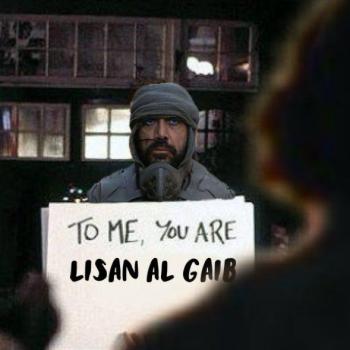Jerry Coyne shared this Non Sequitur cartoon from today’s paper, saying that it dispels the fallacy that religious believers all worship the same god:

The view that religious believers in different religious traditions worship the same deity is itself a particular religious viewpoint. It does not deny that many, perhaps the majority, in a large number of religious traditions, disagree with the identification. And so, since I don’t think that most people who claim that various religions worship the same God would say that all adherents of the religions in question accept that viewpoint, I am not sure that the cartoon makes the point that Coyne thinks it does – or to the extent that it does, it is not saying anything new or surprising.
Within the framework of strict monotheism, there is of course no other god for others to believe in. And so it would make no sense to say that someone worships a different god – only that they do not worship God at all, or do not think about God correctly.
Depending on whether one’s monotheism is exclusive or inclusive, one may view other religions differently within a monotheistic framework. Within the Qur’an, for instance, one finds this famous statement in Sura 2:62, illustrating a more inclusive monotheistic approach (which again, does not translate into this being the viewpoint of all Muslims):
Surely those who believe, and those who are Jews, and the Christians, and the Sabians, whoever believes in Allah and the Last day and does good, they shall have their reward from their Lord, and there is no fear for them, nor shall they grieve.
From the perspective of many religions’ mystical traditions, God is ineffable, and so not only the religious language of others, but also of one’s own tradition, is myth, and metaphor, and symbol. And so often mystics will indeed say thing similar to what Omar Khayyam does:
Hearts with the light of love illumined well,
Whether in mosque or synagogue they dwell,
Have their names written in the book of love,
Unvexed by hopes of heaven or fears of Hell.
And so the view that there is one ultimate reality that the diverse religions of the world point to – not necessarily viewing all as pointing to it equally adequately – these are themselves specific religious viewpoints. Those who hold them advocate adopting this pluralistic approach, and do not, in my experience, assume that everyone thinks as they do.
If such pluralists carried a sign in the cartoon saying that all religious language is myth and symbol, and that all worship the same God, they might well find themselves in a streetcorner fight over the issue if they encountered one of the other sign-holders…












